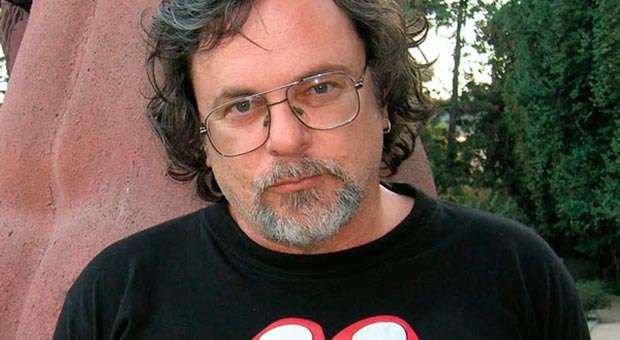The well-known filmmaker and screenwriter won the Coral Prize for Best Short Film with ¨Casting¨ in the 35th edition of the International Festival of New Latin American Cinema, Havana 2013.
Some describe him as “incisive filmmaker” and he answers: “It’s a redundancy, I p refer director or creator.”A film written by Del Llano gives off its smell from distance, it has the ability to provoke, to make people laugh and also think. He does not try to mortify with his work, what matters is his talent-and he has enough-and the immense desire to continue, stubbornly, making movies.
What are the most characteristic elements in your work, which, until now, have not been modified or abandoned?
You’re asking me to become a critic. I guess humor is one of the most significant things that characterize what I do. It does not mean it always works, although I always try it. In the cinema and literature I love the fantasy and science fiction, or at least certain areas of them and probably also certain iconoclastic style, both in the political and ethical field, various types of social grants that from time to time, it’s healthy to put them into question, at least show them.
Some people describe you as “incisive filmmaker.” Do you search these attributes in your work or do you work for it?
Not at all. If people go and look in other areas of my work as the film Vinci, for example, they can check that I have other interests that come from my readings and are not necessarily aggressive or incisive.
I tell the stories I want, the ones that like me and captivate me; those where I can get into, both in a spicy short film such as ¨Nicanor¨ or a story of ¨Vinci¨ that has nothing to do directly with Cuban reality.
And all that comes into my field of interest and I do it with more or less luck when the time comes. But I do not try people to take me for “incisive”, somehow it also bothers me a lot. So, I do not say that that adjective is inappropriate for many things, but it is very similar to the actors who are identified with one type of character.
¨Alicia en el pueblo de las Maravillas¨ was a film which at the time caused all kinds of controversy and even suffered censorship in several exhibition circuits. From Daniel Diaz Torres to other intellectuals expressed in favor of that work. Did the film affect your creative ability?
No, quite the opposite. Alicia … was my entry into cinema. Until then I had not done anything and had not even thought to devote myself to that. But Daniel discovered a story by group ¨Nos -y-otros¨ that liked him very much. He contacted us and we started to work together. It meant an open door and not a closed one; it is true that a “dangerously open” door. It was a very tender moment, the Special Period was beginning, the socialist bloc had fallen and soon there were readings as valid as any others. I’m not saying that some have been correct and some not, but in any case, readings were given more importance at the expense of others, and suddenly it seemed that we had made an exclusively contestatory movie with this and that.
I admit that to be one of the possible readings, but not necessarily the only one that was in our minds. It was a rough start, but somehow-for which I will always be grateful to Daniel Diaz Torres, it was like discovering how much I liked the cinema; something like “coming out of the intellectual closet.” An entrance with the left foot…
After that I was lucky to work with Chijona , Fernando Pérez … an honor.
Speaking of Nos-y-otros group, what direction did they take after Alicia…?
I think after Alicia … we were all “under the microscope”…
Was there any fear?
In the moments after the movie, yes. We did not know what would happen. We were young and every newspaper was accusing us of “larvae in the swamp of opportunism ” and we could not reply that.
But it was not the fear of being put under a rock but the uncertainty of what would happen. We kept doing the same things; we did not change our course. If there was fear, it was not cowardice, which are two different things.
Writing stories about the densest periods in Cuba is a “hook” that makes anyone laughs. Do not you think this an easy way of doing things?
You are right if you limit it only to that. People have a very romantic idea of what filmmaking is. In Cuba, d uring 1990s, movies were made with Cuban money and materials coming from socialist countries.
After the socialist bloc fell down and all the transformations occurred , you were in the dilemma of making the decent film you wanted or the proposals by foreign producers. It was that or doing nothing. That was the variant.
Then you tried to give some dignity to the product and not let them take you to where they wanted on commercial terms. If you did not you make a co-production you could not make a film. I do not think we have chosen the theme for convenience or easy laugh. Our everyday life is something that has always interested. You write and shoot and on what you want to tell at the time.
It is clear that Eduardo del Llano does not live in the ¨ivory tower¨ writing or devising something…
The keyword here is tower. I’d like living in one. (He laughs)
How do you think about all these stories?
Well, my friend, what is difficult for me is going out and not to think of any story that may be a “super critical” science fiction developed in the 12th century … But, well, I live more or less like everyone else. I do not have a private café, neither I sell hotcakes … I do not have any secrets up my sleeve, or powerful family either.
In Cuba, Nicanor´s short films have had very few exhibits; a character that always experiences quite ” risky” circumstances. Is it Nicanor, Eduardo Del Llano’s second self ?
Mine but also yours, surely. First, in this country if you manage to survive long enough, you end up becoming a classic. If you do not “explode” the first time, in the second or third time you start being treated as someone significant. That comes from Silvio Rodríguez and lots more back. Every artist who gets into trouble by honestly defending what he believes has a very difficult time. That does not mean I’m a classic, I’m far from that. But 10 years after the first Nicanor, even the press freely speaks about him, he has been integrated into Cuban culture, which was always my initial intention.
That was the product of a time and does not mean that I will not continue telling stories that way, but Nicanor became very expensive for independent cinema. If I can raise the money, I’m sure Nicanor´s return or Nicanor. Second season will appear.
Nicanor´s short films have not had the privilege of being displayed by Cuban Television either…
If there is something that Nicanor has not brought, that’s joyful. It has been treacherously “pirated” everywhere and even in Miami. Among all the short films there were nearly $ 30,000, of which I have not recovered, literally, not a single dollar. If that is not love to art, somebody can come and explain me. Let’s talk about Omega3, a different film if you want to see it that way. What’s the film about?
I do not want to say too much about it. It is a kind of futuristic satire, let us clarify both things. It is not a comedy on the surface. I hope the viewer to laugh a few times, but it’s not a movie to laugh uproariously because, in fact, the circumstances of the plot are quite bitter. There are deaths, torture, strong things. It takes place in an undetermined future and country.
Finally, what did Daniel Díaz Torres mean to your professional and personal life?
Daniel was the first who, for better or worse, entered me into the cinema. He trusted me and that’s something I will always appreciate, in addition to maintain that confidence. But aside from the five films we did together, he was like my older brother; the guy I asked for advice about a movie or a personal issue. Over 20 years of friendship … I do not have brothers, so Daniel is one of those few people that I can give that denomination…
By: Jaime Masó Torres










